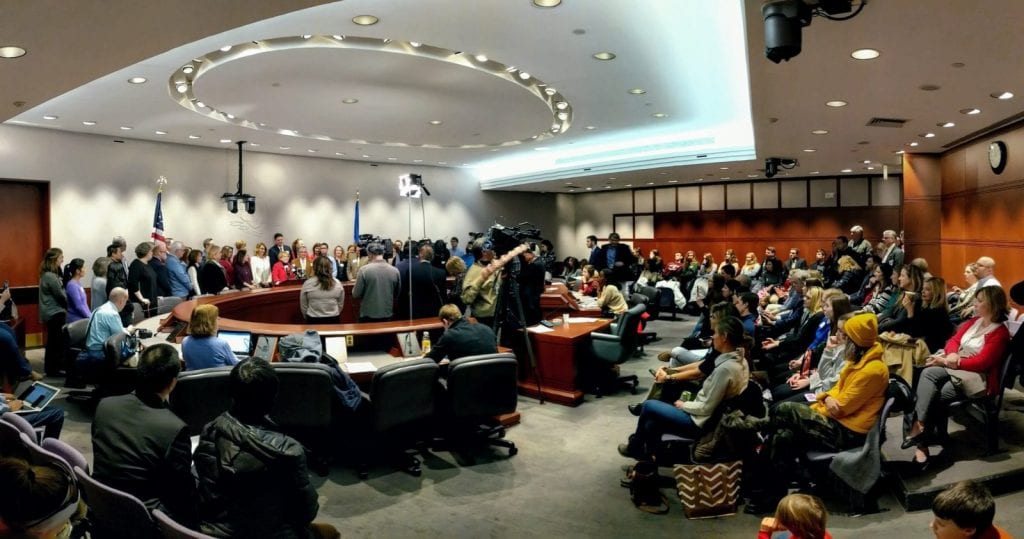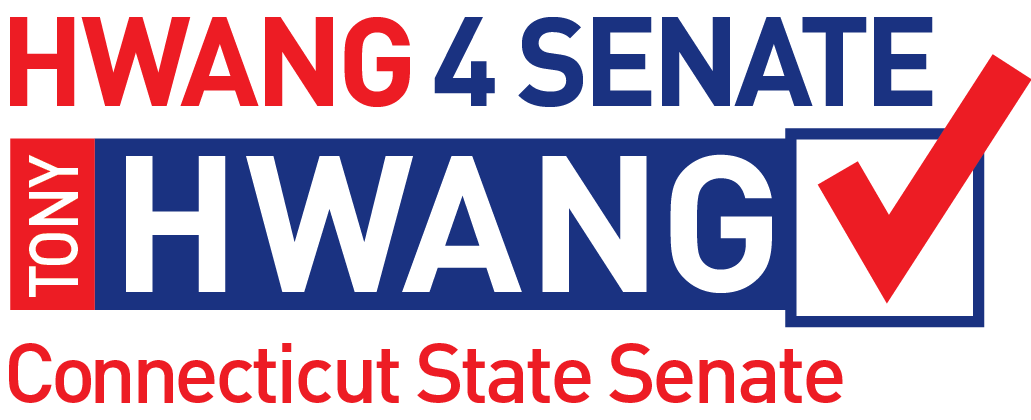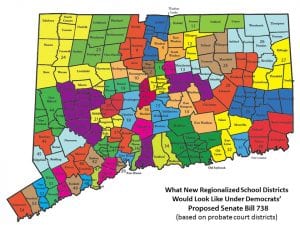Senator Tony Hwang Fights “Forced School Regionalization”, Calls on Gov. Lamont to Eliminate Education Cost Shifts in State Budget

Packed room where Rep. Gail Lavielle hosted a press conference with House & Senate colleagues to fight against Forced School Regionalization on March 1st, 2019
*****
State Senator Tony Hwang (R-28) released the following statements following the Education Committee Public Hearing on March 1st considering several bills (SB 457, SB 874, HB 7150 & SB 738) surrounding forced school regionalization and redistribution of teachers’ pension liabilities onto municipalities.
“These bills assume a one size fits all approach to regional school districts. Creating an arbitrary number of students or residents that trigger forced regionalization will not lead to best results. Depending on the size of the town and part of the state, regionalization could even result in higher costs and reduced efficiencies. For those towns where regionalization creates synergistic opportunities and cost efficiencies, consolidation is already happening and we should focus on breaking down barriers to natural regionalization.”
“We elect our school board members to do what is best for our schools. If those members think regionalizing with another town(s) is responsible and prudent, then it is their responsibility to make that case to the people they represent. That way would certainly lead to better results, where proposals to regionalize certain districts are vetted on a case by case basis instead of just creating a random threshold imposed by the State.”
“Ways to make our school systems run more efficiently certainly need to be encouraged and investigated, but our end goal is always the same: the best education for our students. Our town BOE’s should continue to investigate ways to improve our schools and make things more efficient, but they should not have the threat of forced regionalization hanging over their heads to do that.”
- SB 457 would force any school district with less than 2,000 students to regionalize (impacting an estimated 84 towns)
- SB 738 would force any town with a population of less than 40,000 to consolidate with other towns to form new school districts matching the state probate court districts shown right (impacting an estimated 144 towns, see graphic to right)
- SB 874 is one of the Governor’s bills, which would create the commission in charge of redistricting, outlines their duties, and enacts the penalties to any school that does not regionalize
- HB 7150 is a broader bill implementing several of the Governor’s proposals regarding education including shifting 25% of teacher pension costs to municipalities, some cuts to services and programs, and accelerated reductions to some education cost sharing grants.
Senator Hwang also took the opportunity to discuss, for the second time, his serious concerns with Governor Lamont’s budget proposal and its effects on municipal and education aid.
“Furthermore, Governor Lamont has proposed penalizing small districts that ‘choose’ not to ‘re-district’ or ‘regionalize’. This is a false choice and this kind of heavy handed approach to forcing a quick and dramatic change to municipal organization reminds me of his predecessor, not the collaborative persona I have come to expect from the Governor. This is not a carrot, it is a burdensome financial hammer!”
“And forcing 25% of teachers’ pensions, a state obligation, onto towns overnight? How does Gov. Lamont expect our municipalities to budget and organize for all these changes and new costs over one budget cycle? Our towns constantly struggle with the state’s unpredictable budget. And in the midst of all this uncertainty he is asking for more money from them as well, just as I warned he would in my letters to the leadership of towns in my district earlier this year and my recent letter to Governor Lamont.”
“I hope he starts to feel the pressure that I am hearing about, because our municipalities, our schools, and our constituents are saying loud and clear that this is unacceptable.”
While encouraging towns to share services is a laudable goal, each school and school district has unique needs and forcing towns and cities to regionalize without considering those needs creates a whole host of problems:
- Less time in the classroom and more time on the bus, especially in rural areas like Newtown, Weston and Easton where proposed districts would be very large geographically.
- Dramatic increases in busing expenses for towns and cities. While the state used to pay for busing costs, towns and cities are now solely responsible for those costs, and more time on the bus means higher costs to towns.
- Wasted taxpayer investments in new and newly renovated schools. If your town just invested in a new school renovation, it may now be all for nothing if the school no longer fits the needs of a regional school district.
- Potential new costs to build new schools to meet regional needs.
- Raises concerns about how to preserve quality of education.
- Loss of teaching positions. If towns are forced to consolidate, this could impact number of teachers and classrooms.
- Loss of local control over school decision making. Forcing regionalization leaves little room for towns, cities and local residents to have a say in what their children are learning.
“Many of you have already called and written to my office and your opinion is important. If you want to speak out about proposals about either ‘forced regionalization’ and/or ‘teacher pension redistribution’ please share your thoughts with my office at (860) 240-8805 and tony.hwang@cga.ct.gov or submit written testimony to the Education Committee at edtestimony@cga.ct.gov.”
Senator Hwang Testimony Opposing Forced School Regionalization
Written Testimony of: State Senator Tony Hwang, 28th District
To: The Legislature’s Education Committee
In Opposition to: SB 457, SB 738, SB 874 & HB 7150
Public Hearing – March 1st, 2019
I appreciate the opportunity to submit this testimony to you today in strong opposition to forced school regionalization, and certain cost-shifts onto our municipalities outlined in SB 457, SB 738, and in Governor Lamont’s proposed SB 874 & HB 7150
These bills assume a one size fits all approach to regional school districts. Creating an arbitrary number of students or residents that trigger forced regionalization will not lead to best results. Depending on the size of the town and part of the state, regionalization could even result in higher costs and reduced efficiencies. For those towns where regionalization creates synergistic opportunities and cost efficiencies, consolidation is already happening and we should focus on breaking down barriers to natural regionalization.
We elect our school board members to do what is best for our schools. If those members think regionalizing with another town(s) is responsible and prudent, then it is their responsibility to make that case to the people they represent. That way would certainly lead to better results, where proposals to regionalize certain districts are vetted on a case by case basis instead of just creating a random threshold imposed by the State.
Ways to make our school systems run more efficiently certainly need to be encouraged and investigated, but our end goal is always the same: the best education for our students. Our town BOE’s should continue to investigate ways to improve our schools and make things more efficient, but they should not have the threat of forced regionalization hanging over their heads to do that.
Furthermore, SB 874 proposes penalizing small districts that ‘choose’ not to ‘re-district’ or ‘regionalize’. This is a false choice, and this kind of heavy handed approach to forcing a quick and dramatic change to municipal organization reminds me of our previous Governor, not the collaborative persona I have come to expect from the current administration. This is not a carrot, it is a burdensome financial hammer!
And forcing 25% of teachers’ pensions, a state obligation, onto towns overnight? How can we expect our municipalities to budget and organize for all these changes and new costs over one budget cycle? Our towns constantly struggle with the state’s unpredictable budget. And in the midst of all this uncertainty he is asking for more money from them as well, just as I warned he would in my letters to the leadership of towns in my district earlier this year and my recent letter to Governor Lamont. HB 7150 addresses some serious issues in education and I understand that we must find ways to cut costs. However, Section 6 and others that “find savings” simply by pushing costs onto municipalities must be reconsidered.
Encouraging towns to share services is a laudable goal. However, each school and school district has unique needs and forcing towns and cities to regionalize without considering those needs creates a whole host of problems:
- Less time in the classroom and more time on the bus, especially in rural areas like Newtown, Weston and Easton where proposed districts would be very large geographically.
- Dramatic increases in busing expenses for towns and cities. While the state used to pay for busing costs, towns and cities are now solely responsible for those costs, and more time on the bus means higher costs to towns.
- Wasted taxpayer investments in new and newly renovated schools. If your town just invested in a new school renovation, it may now be all for nothing if the school no longer fits the needs of a regional school district.
- Potential new costs to build new schools to meet regional needs.
- Raises concerns about how to preserve quality of education.
- Loss of teaching positions. If towns are forced to consolidate, this could impact number of teachers and classrooms.
- Loss of local control over school decision making. Forcing regionalization leaves little room for towns, cities and local residents to have a say in what their children are learning.
Sen. Hwang, Rep. Kupchick Team Up to Protect Police K9s (Patch)

From The Office of State Rep. Brenda Kupchick: State Rep. Brenda Kupchick (R-132) and State Senator Tony Hwang (R-28) testified with Fairfield Police Sergeant Hector Irizarry on legislation to permit Police K9’s get the same care as their human partner officers receive when injured in the line of duty.
The legislation, H.B. 6364: An Act Concerning Protections for State and Local Law Enforcement K9S would permit ambulances to transport a law enforcement K9 to an emergency animal hospital when and allow emergency medical service providers to administer an opioid antagonist (NARCAN) intravenously and to provide basic first aid to a law enforcement K9. Additionally, the bill would permit state and local law enforcement K9 officers to carry opioid antagonists that may be administered to a K9.
K9 units in law enforcement are critical to the war on the current opioid crisis and the preservation of life. The ability that dogs have to discover drugs is far greater than that of humans. Unfortunately, the care that is allowed for our working K9s when they are injured or experiencing a drug overdose does not reflect the significant role they play in ending the drug crisis.
According to Sergeant Hector Irizarry, current law prohibits K9 dogs which are injured in the line of duty to be transported in ambulances or allowed to receive care from EMTs.
Rep. Kupchick said, “The result of these restraints is that K9’s have to be taken to a veterinarian in a regular vehicle which prevents the handler from giving care to the dog while on the way. In many cases a K9 can suffer from an opioid overdose on the way or loss of blood. It is possible for the dogs to overdose on drugs if they are trained to dig and bite at the objects of their interest.
“Police dogs (K9) are law enforcement officers, they are absolutely critical to many of the day to day operations that our human law enforcement officers undertake, including every aspect of public safety and community relations in our state. Our Police K9s sacrifice their safety and encounter high risk in the line of duty, just like their handlers, and are also incredibly valuable in terms of the training and skills they possess. They deserve to have access to the same life-saving care that our human officers do to protect their well-being as well as our investment,” said Sen. Hwang.
In five states, K9s are allowed to be transported in ambulances. In two states, EMTs are allowed to provide care to a K9. There is no state which has passed a law which allows both the care of the K9 and the transportation of one in an ambulance to a veterinarian.
Sen. Hwang, Fellow Westport Representatives Comment on Tolls (Westport News)
Excerpts from the article as it appears in the Westport News:
WESTPORT — State representatives are speaking out both in favor and against tolls after Gov. Ned Lamont offered two potential paths for instituting highway tolls in his budget proposal last week.
State Sen. Tony Hwang, R-28, said tolls wouldn’t be an immediate “panacea to our transportation ills.” When asked about solutions, said he was open to exploring public private partnerships and a prioritization of transportation projects through the Legislature.
Although he does not have a vote in the Legislature, Westport First Selectman Jim Marpe said he’s concerned tolls may may aggravate traffic in town if people choose to use local Westport roads to avoid highway tolls. Marpe said he’s also worried about the impact of tolls on people who commute into Westport to work from out of state.
“I’m as much an advocate to fix our transportation system as anyone and recognize this will take billions of dollars,” Marpe said, adding he’s in favor of tolling trucks, but wants to see the state reduce costs through pension reform to free up money for transportation fixes.
“It isn’t enough to keep raising money. I think we need to save money as well and direct it toward important transportation infrastructure investments,” Marpe said.


